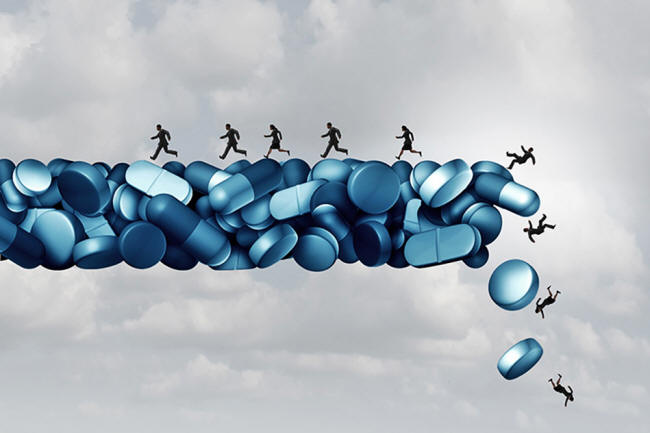|
by Dr. Tim Coles
Vol. 14 No 2 (April
2020)
The alternative health industry, by comparison, is worth just $59bn.
The biggest, multibillion-dollar companies are,
The bulk of their profits come from prescription drugs.
Big Pharma kills people in two ways:
It often is cheaper for Big Pharma to break the law and pay fines than follow regulations that hinder profits.
Every year at least one major drug company is fined for one or more of the following:
Since 2000 in the US alone,
Profits are boosted by what Elaine Hollingsworth calls,
Despite living longer, obesity, depression, dementia, increased cancer and other morbidities, mean that Westerners are now less healthy than just a few generations ago.
Big Pharma pathologises minor ailments and makes people dependent on drugs instead of encouraging the use of natural alternatives.
The crisis of the industry's influence over the medical profession, from reporting trial results to influencing doctors, prompted the British Medical Journal (BMJ) to launch a,
Dr Larry Dossey writes that in the 1900s, medical companies sought,
This was the beginning of
what the science writer Julie Deardoff calls "fictionosis."
Data was supposedly supplied by one Dr Leth Argos; a pun on lethargy.
Their fake research was
published in the BMJ.
In the 1960s, Dr Keith Connors was paid by the drug company CIBA to trial Ritalin.
Connors set a precedent for trialing Big Pharma-sponsored drug studies on children via university-affiliated clinics. Connors watched this model get out of control to the point where he called misdiagnoses of Attention Deficit Hyperactivity Disorder (ADHD) "a national disaster."
Journalist Alan Schwarz revealed that although only 5 per cent of US children actually have ADHD, 15 per cent are diagnosed with it.
This is largely due to Big Pharma pushing its products on doctors and families. Thirty per cent of all boys in the American South (i.e., the poor states) are misdiagnosed.
Schwarz claims that Big Pharma paid "all the top researchers" to publish studies claiming that ADHD drugs are safe.
Big Pharma then took the false data from their subsidized studies and constructed advertisements targeted at worried parents. The advert for Adderall XR, for instance, claimed that the drug boosts the child's grades to match their intelligence.
Schwarz says that,
Yet, many remain on the
market...
Ghostwriting becomes apparent thanks only to whistleblowers and court orders. Researchers Healy and Cattell discovered 85 academic papers written by drug companies with the author's name still to be determined.
Fifty-five were written by Pfizer, and 30 were either funded by Pfizer or based on Pfizer's data. Just two articles declared a conflict of interest, and every single one reported positive results.
In 1999, Merck introduced the painkiller Vioxx.
By 2004 it was withdrawn
after being linked to cardiovascular disorders. Merck had previously
hired ghostwriters despite having internal knowledge that the drug
may increase the risk of thrombus formations.
Elsevier's Australia office published six such journals between 2000-05:
Compare this to,
The World Health Organization (WHO) says that by 2012, 80 per cent of the world's population was using alternative health therapies, including people in so-called developed countries.
Around that time, 400
high-profile Australian doctors and scientists formed Friends of
Science in Medicine, a lobby to remove alternative health degree
courses from universities.
Ex-salesman and former leader of the Nordic Cochrane Centre, Dr. Peter C. Gøtzsche, writes:
He quotes The Lancet as saying that medical journals,
By 2010, 85 per cent of drug company-funded trials of new medicines yielded positive results for the top five products (e.g., antidepressants), compared to just half for government-funded studies.
In Australia in 2017, Lisa Bero of Sydney University's Charles Perkins Centre found that drug industry-sponsored trials of medicines and equipment were 30 per cent more likely to report favorable results.
Lobbying means that drug prices in Australia are double those of the UK and three times the cost of medicines in New Zealand.
By 2017, Australians were
paying $500m above the average for seven common drugs.
In 2015, US Congressman Tom Price bought stock in Innate Immunotherapeutics.
A year later, he purchased stock in,
Price then went to Australia as part of a Congressional visit where he lobbied the government to drop its protectionist measures in the US-led Trans-Pacific Partnership deal.
Innate Immunotherapeutics, which has a Sydney office, offered Price a discount on additional stock, making him a $150,000 profit.
Price went on to become
Donald Trump's Health and Human Services Secretary.
Additional blurring occurs in the promotion of drugs, including Viagra and Prozac, as lifestyle drugs in which the judgmental competence of the consumer is weighed against that of the qualified physician.
As part of their marketing strategy, Australian drug companies engage in so-called asset exchanges with community organisers, patients, and GPs.
They anonymously pay speakers to promote the wonders of drugs at conferences, take GPs out to dinner, infiltrate online patient chatrooms, and so on.
In the absence of scientific evidence, the producers of HRT drugs spent billions of dollars on PR groups like HRT Aware and RED Consultancy, promoting HRT as a "cure" for,
HRT Aware featured women claiming to have improved their careers, overall health, sex lives, and general wellbeing - all thanks to HRT.
HRT Aware turned out to be an industry group comprised of oestrogen producers, including,
After the truth emerged
in 2002 - that HRT drugs increase the risk of heart disease and
double the risk of breast cancer - the drug-maker Novo Nordisk
hired the German PR firm Haas & Health Partner to write
letters to GPs downplaying the deadly results.
Around 170,000 Americans die annually in accidents:
Included in that statistic is 70,000 deaths by drug overdose, meaning that drug overdose is the leading cause of death-by-accident in the US.
Opioids include,
Producers including Purdue Pharma - which "aggressively" marketed OxyContin (spending $200m in 2001 alone) - deliberately targeted doctors serving ethnic minority patients known to be at risk of addiction in de-industrialized areas like Kentucky and Ohio where disaffected communities succumb to "deaths of despair."
One of the big opioid dealers, Mallinckrodt (tax-haven in Ireland), went bust after paying $1.6bn in settlements over its opioid scandal.
Between 2006 and 2012, Mallinckdroft flooded the US with 76 billion hydrocodone and oxycodone pills.
Ohio-based distributor Steve Cochrane joked:
Accounts manager Victor Borelli responded:
Each year, one in four adults in England alone (12 million people) are prescribed addictive drugs including antidepressants and opioids.
At least one million people in England are potentially hooked on painkillers as are 1.4 million Australians.
Each year, around 1,000 Australians die of opioid overdose:
In 2018, 4.3 million Australians took 39 million prescribed drugs for mental health issues.
Indicative of the ease with which physicians diagnose and prescribe, 86.3 per cent of prescriptions came from GPs compared to just over 12 per cent from mental health specialists.
The overwhelming majority of prescriptions were antidepressants (over 70 per cent), compared to just 10 per cent for antipsychotics and 5.6 per cent for sedatives and hypnotics.
Countries from South Africa to Thailand are saying 'no' to international treaties that allow giants to monopolize patents and charge unaffordable prices.
Big Pharma recognizes the public appetite for natural products, hence its effort to corner the market.
Accountability journalists like those at ProPublica expose GPs' conflicts of interest via the "Dollars for Docs" project, such as the 2,500 physicians who received over $500,000 each between 2014 and 2018 from drug and medical device companies (700 of whom received $1m).
The money came in the form of consultancy and lecture fees.
The Alliance for Natural Health International documents efforts by the so-called Good Thinking Society, Quackwatch, and others, to delete the Wikipedia profiles of natural and alternative health advocates and/or insert potentially libelous material into their bios.
Victims include doctors,
Growing numbers of people are eating more healthily and looking for non-allopathic treatments...
The Hartman Group notes that,
The year 2019 saw the biggest growth in herbal dietary supplements in the US in over two decades, totaling $8.8bn.
Although most GPs are good people who do great work, it is important to also see them as potential proxies for a huge, unethical industry, and learn to distinguish the necessary drugs from the unnecessary ones.
Footnotes
|




